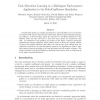22 search results - page 2 / 5 » Multi-agent task allocation: learning when to say no |
GECCO
2007
Springer
13 years 11 months ago
2007
Springer
Imagine a group of cooperating agents attempting to allocate tasks amongst themselves without knowledge of their own capabilities. Over time, they develop a belief of their own sk...
MAGS
2010
13 years 2 days ago
2010
Coordinating agents in a complex environment is a hard problem, but it can become even harder when certain characteristics of the tasks, like the required number of agents, are un...
AAMAS
2008
Springer
13 years 5 months ago
2008
Springer
Abstract Multi-agent simulation is applied to explore how different types of task variety cause workgroups to change their task allocation accordingly. We studied two groups, gener...
SELMAS
2005
Springer
13 years 10 months ago
2005
Springer
We argue that it is useful to study classes of Multi-Agent System (MAS) architectures, corresponding to architectural styles in addition to particular tures. In this work we focus ...
ATAL
2005
Springer
13 years 10 months ago
2005
Springer
Mediation is the process of decomposing a task into subtasks, finding agents suitable for these subtasks and negotiating with agents to obtain commitments to execute these subtas...

